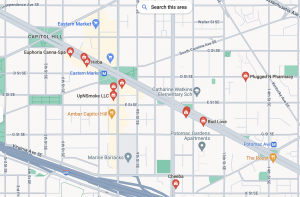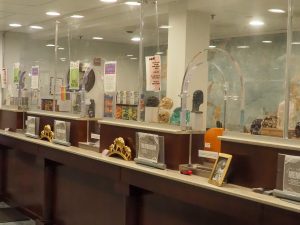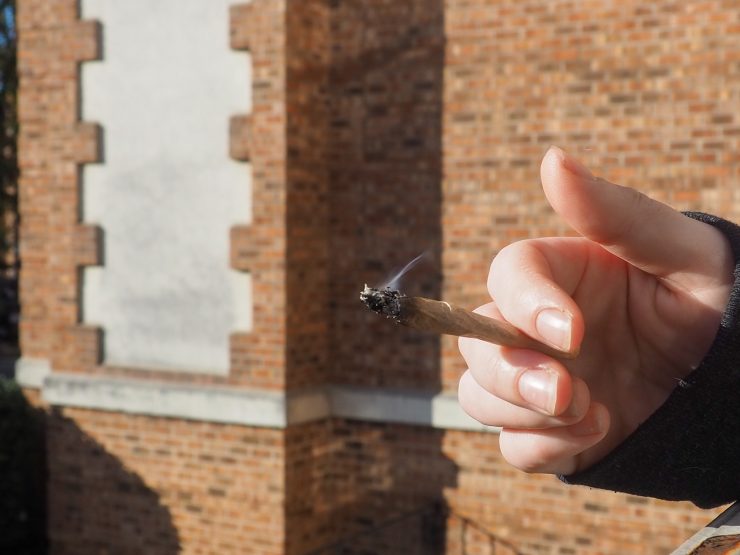Walking down Pennsylvania Avenue in the Capitol Hill neighborhood, you will pass many of D.C.’s adult-use retail cannabis shops. These stores are located around popular retail centers and can often be found next door or across the street from one another. A new D.C. law aims to bring many of these stores into the existing medical cannabis framework and has the potential to trigger a rush of applications seeking to lay legal claim to the area.
Cannabis gifting
Over 100 businesses in D.C. provide cannabis to consumers through a gifting system that is believed to be a loophole in D.C.’s Initiative 71 (I71) cannabis possession laws. Under this system, customers purchase a non-cannabis item, and an equivalent amount of cannabis is “gifted” to them for free.
The Medical Cannabis Amendment Act (MCAA) aims to bring many of these illegal gifting shops into the legal medical cannabis framework that already exists in D.C.
Starting November 1, 2023, applications for previously unlicensed retail stores will be accepted by D.C.’s Alcoholic Beverage and Cannabis Administration (ABCA). This would allow retail gifting stores to receive their medical cannabis retail license.
Under the MCAA, eligible applications must not be within 400 feet of a previously submitted retailer application. Applications falling under this regulation are reviewed in the order they were submitted until the ABCA approves one.

Lisa Scott, President of the D.C. Cannabis Business Association, believes this has the potential to create a scramble for stores to be the first to submit their application, securing their location for the future.
“You have to be the first one. It’s just like first come, first serve. So if you have a store to your right and a store to your left, and they all three put their applications in, whoever gets approved first will probably be the one to stay.” Scott said.
Chander Jayaraman, the chair of Advisory Neighborhood Commission 6B’s Alcoholic Beverage & Cannabis (ABC) Committee, believes that the licensing process will be highly competitive.
“So what’s going to happen come November one is, we’re going to have a host of these applications from different retailers, I 71 stores that are all located all around. And the limitation is that you cannot have more than one within 400 feet of each other,” Jayaraman said at an ANC meeting on October 3.
“It sets up kind of a Hunger Games kind of situation. Where the first people to get the right documents into them and get approved and approval from us. They get all the others within the same block or out,” Jayaraman said.
There are three ways to apply, online, in-person and through email.
Fred Moosally, the Director of D.C.’s ABCA, said they are ready for the rush of applications on November 1.
“It’s imperative that we have exactly who got where first. So we’ll be there. In the event folks come early, we’ll be there early to prepare for that. We’ll obviously be monitoring the activity online. In terms of the filing, making sure the systems are working, checking email. We’ve been through this experience many times through you know, liquor license moratoriums, where there’s limited amount of spots,” Moosally said.
Unlicensed stores
Andrew Frenkel, chief managing officer for Taste Budz, has seen the expansion of these unlicensed cannabis stores firsthand.
“I moved here in December, and I’ve probably seen over 100 shops open, you know, on H St. George Avenue, Georgetown, Cap Hill. I mean, these shops pop up, left and right. And the thing is, like we said, originally, they’re not; they’re thinking quick cash, they’re doing cash only, they’re not paying taxes, they have a six-month lease, and they’re just going to run it until they can’t,” Frenkel said.
Upon entering Taste Budz D.C., one is met with a well-lit, marbled space furnished with a vast array of cannabis products. Behind a security wall formerly used by a BB&T bank, “bud-tellers” assist customers. This modern experience exemplifies businesses seeking to bring greater legitimacy to the cannabis industry in D.C.

“They want it to be like a safe, peaceful environment. You know, they don’t want like, you know, as bad as it sounds like they don’t want it to be an environment that they have in their mind,” Frenkel said.
The number of unlicensed stores is much greater than seven current medically licensed stores, and the sale of medical cannabis has grown over the years.
“We’re not out here trying to be thugs and drug dealers, and all that kind of stuff. I mean, there’s a lot of consumers. If the consumer demand wasn’t there, none of this would exist,” Scott said.
Medical Cannabis Amendment Act
The MCAA became law on March 22, 2023. It eliminates the cap on the number of medical licenses available in D.C., permits adults to self-certify their medical use license, enables unlicensed gifting stores to acquire a medical license, and paves the way for businesses to become safe-use facilities where adults can consume cannabis on the premises.
Considering D.C.’s limited options, Scott sees this as a positive step forward.
“The D.C. government found a way to open the door by releasing the ceiling of how many licenses they can get out,” Scott said. “We don’t really have a choice. I mean, that’s the workaround to get people who want to be in the business.”
Before the implementation of the Medical Cannabis Amendment Act, the overarching regulation of cannabis in D.C. was guided by the Harris Rider bill, which stipulated that no funds could be used to legalize or reduce penalties associated with the recreational use of cannabis products.
Regulations
Illegal, unlicensed cannabis stores have greater autonomy over their products than medically licensed stores. Medical stores must purchase their products from other licensed producers instead of gifting stores that can source their products from producers with little oversight and regulations.
“I do think that there’s quite a bit of counterfeiting when it comes to name brand, West Coast brands,” Frenkel said. “There’s a couple of brands that people can get the packaging for and then create the product themselves because the name brand sells for more.”
The MCAA is aiming to grow the medical industry and with it, decrease the number of illegal stores. It allows illicit stores to become licensed to avoid future enforcement measures.
“There’s an opportunity for these stores to come in, become legal, not have to worry about, you know, the possibility of enforcement,” Moosally said. “The bill also contains a provision that does not have enforcement start until 315 days when the lobbying takes effect, and then the light took effect on March 22, 2023. So enforcement can’t start until January 31, 2024.”
Supply and demand
Frenkel said the store intends to apply for a medical license and, while excited about the prospects of a growing medical cannabis industry, has reservations about whether this aligns with the needs of businesses.
“The biggest issue with licensing is having enough marijuana for everyone. Because if you become a medical licensed dispensary, you’re required to get your product from licensed growers and agricultural like dispensaries in D.C., which there are very few of right now,” Frenkel said. “If all of those I71 shops go away, and there’s just a handful of medical shops, we’re all going to be at each other’s throats trying to get the best quality weed for the best price.”
To compensate for this, D.C. has already increased the number of producers and manufacturers that are able to supply medically licensed stores to meet the demands of a growing industry.
“There’s several large cultivation centers, two to be exact, that are expected to open in the first half of 2024 that are rather large. We’ve had thus far, as of October 23, We’ve had 68 cultivation center applications that we processed,” Moosally said. “In addition, there’s existing cultivation centers already open, that have the ability to increase their capacity, as more stores come in on board. They’ll be able to increase how much cultivation cannabis they produce.
Customers
Frenkel said the current system works for people and isn’t sure a large push towards a regulated medical industry is best for consumers.
“I think consumers want it to be as easy and discreet as possible. It’s like buying alcohol, no one has to know, they can use cash, they can use a card,” Frenkel said. “I think with the medical side, there’s a lot more things you have to do to get through the door that is going to turn people away.”
Medical cannabis in DC
Medical cannabis sales have steadily risen since its establishment in D.C., even with competition from I71 gifting stores. As of September 2023, sales have reached $2,679,127 more than they did in September 2022 and have more than doubled sales over the same period in 2019, according to ABCA data.
The MCAA also aims to provide restitution to those harmed by cannabis laws. It requires that social equity applicants are issued at least 50% of all new licenses, and 75% of their application and licensing fees are waived for the first three years, according to the ABCA website.
The number of approved social equity applicants determines the number of future medical cannabis retailers.
"The amount of non-social equity applicants we can issue during this open application period is solely based on how many social equity applicants we get. So, if we get 20 social equity applicants, we can approve 20 from non-social equity applicants. So that'll be a huge factor in terms of how many get approved, will be based on how many social equity applicants apply," Moosally said.
The best example of who might qualify under this program is an individual related to someone who has been convicted of a drug-related offense and has an income that does not exceed 150% of the median family income.
“It's for people who have been harmed through the criminal system. And the people, these people who wanted to be in a business, but they weren't able to get licenses and actually become a legal business,” Scott said. “So it's basically reparations for social equity, for social equity applicants. It's basically reparations.”
D.C.'s cannabis landscape is set to change quickly in the coming months. It is navigating a path towards greater legitimacy, regulation, and social equity that is marked by both excitement and concerns as it strives to meet the needs of consumers and businesses.
“We won’t wait until the end of the period at the end of January to start processing. We'll start processing them on November 1,” Moosally said.















Hi Nicholas !
Great message for the benefits of patients that need medical cannabis .
Please connect with me at Jagos@bennabis.com
We need to discuss the way Bennabis Health is supporting medical patients
John
[…] by Regulatory Bodies: The Alcoholic Beverage and Cannabis Administration (ABCA) and the Department of Health play crucial roles in scrutinizing these applications to ensure […]
[…] by Regulative Bodies: The Alcoholic Beverage and Marijuana Administration (ABCA) and the Division of Health play crucial roles in inspecting these applications to guarantee […]